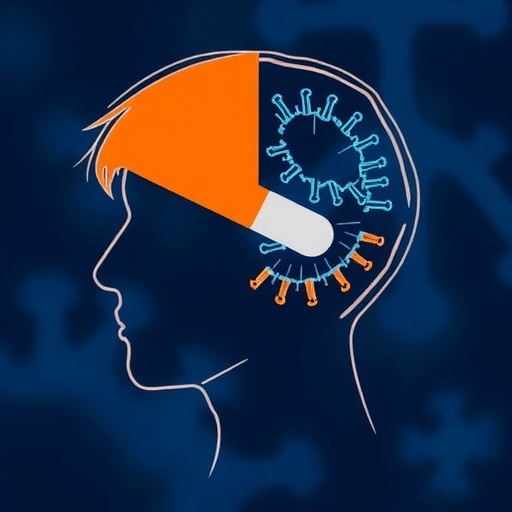In a groundbreaking study published in BMC Psychiatry, researchers have unveiled compelling evidence that COVID-19 infection significantly alters the serum concentrations of commonly prescribed antipsychotic medications. This revelation is particularly crucial given the global scale of the pandemic and the widespread use of antipsychotic drugs in managing schizophrenia and other psychiatric conditions. The comprehensive investigation draws attention to the intricate biochemical interplay sparked by the viral infection, challenging current clinical practices and emphasizing the urgent need for vigilant therapeutic drug monitoring.
The research addressed a pressing gap in psychiatric pharmacology by analyzing blood samples from schizophrenia patients both before and after their infection with the novel coronavirus. This longitudinal approach allowed for a precise measurement of changes in antipsychotic drug levels, shedding light on how acute infectious processes like COVID-19 might disrupt drug metabolism. In total, 139 valid patient datasets were scrutinized, providing a robust statistical foundation to support the conclusions.
Results were striking: a marked increase in serum concentrations of olanzapine, quetiapine, clozapine, and risperidone was documented following COVID-19 infection. This amplification was accompanied by an elevation in the concentration-to-dose (C/D) ratio, indicating a significant reduction in drug clearance from the body. Such pharmacokinetic shifts raise critical questions about the metabolic pathways affected by viral infection and the physiological consequences for patients relying on these medications to maintain mental stability.
The study delved deep into associated biochemical changes observed alongside the increased drug levels. Key inflammatory and metabolic markers such as C-reactive protein (CRP), liver and kidney function indices, blood glucose, lipid profiles, electrolyte balance, and myocardial enzyme spectra all exhibited substantial fluctuations after COVID-19 exposure. These systemic alterations provide important clues to the disturbance in enzymatic function that likely underlies impaired drug metabolism.
Investigators found nuanced correlations between the concentration elevations of specific antipsychotics and diverse laboratory markers. For instance, olanzapine’s increased serum level was positively correlated with homocysteine (HCY), globulin (GLO), serum albumin (SA), and mean corpuscular volume (MCV), which may reflect complex changes in protein binding and cellular environment. Similarly, the rise in quetiapine concentrations was inversely correlated with non-esterified fatty acids (NEFAs) and calcium (Ca), while positively linked with monocyte percentage (MON%), suggesting inflammatory modulation of drug transport or clearance.
Clozapine’s concentration increase was positively associated with CRP, a prominent inflammatory marker, and negatively associated with white blood cell (WBC) and neutrophil percentages (NEU%). This link underlines the impact of systemic inflammation and immune cell dynamics on drug metabolism, potentially via cytochrome P450 enzyme inhibition. Likewise, risperidone’s serum elevation showed positive correlations with adenosine deaminase (ADA), gamma-glutamyl transferase (GGT), and red blood cell (RBC) levels, alongside negative correlations with total bilirubin (TBIL), direct bilirubin (DBIL), and blood urea nitrogen (BUN), highlighting a multifaceted biochemical network impacting drug biotransformation.
These findings carry profound implications for clinical psychiatry, as elevated antipsychotic serum concentrations heighten the risk of adverse drug reactions, including toxicity, sedation, and cardiovascular effects. Importantly, the diminished metabolic rate of antipsychotic drugs in the context of COVID-19 infection suggests that standard dosing protocols may be inappropriate during infectious episodes characterized by systemic inflammation. Adjusting treatment regimens based on timely therapeutic drug monitoring could mitigate these risks and improve patient safety.
Moreover, the research underscores the broader concept that inflammation-driven biochemical perturbations—reflected by markers such as CRP, HCY, ADA, and various liver and kidney function indices—have a direct influence on drug metabolism. This insight extends beyond COVID-19, advocating for heightened vigilance in managing patients with any inflammatory condition who are prescribed medications with narrow therapeutic windows.
The extensive data also highlight the necessity of interdisciplinary collaboration among psychiatrists, infectious disease specialists, and clinical pharmacologists. Such teamwork facilitates a comprehensive understanding of how acute infections impact central nervous system drug therapy, enabling the development of personalized medicine approaches that optimize efficacy while minimizing harm.
Future research initiatives could build on these findings by exploring mechanistic pathways at the molecular level, such as cytokine-mediated downregulation of cytochrome P450 enzymes, and investigating how vaccination status or viral variants influence these pharmacokinetic changes. Additionally, larger cohort studies and multicenter trials may validate these observations and refine clinical guidelines.
In summary, this pivotal study alerts the medical community to the significant influence of COVID-19 infection on the pharmacokinetics of antipsychotic medications. It elucidates the complex biochemical landscape altered by infection and inflammation, which diminishes drug metabolism and precipitates elevated serum concentrations. Clinicians are urged to intensify monitoring of antipsychotic drug levels during and after COVID-19 infection to prevent toxicity and ensure therapeutic continuity for patients with psychiatric disorders.
As the global healthcare system continues to grapple with the pandemic’s multifaceted challenges, this research offers vital insights that could reshape psychiatric drug management in infectious contexts. The intricate interplay between viral infection, systemic inflammation, and drug metabolism is a clarion call for innovation in pharmacotherapy, emphasizing safety, precision, and responsiveness in clinical practice.
Subject of Research:
Effect of COVID-19 infection on the serum concentration and metabolism of antipsychotic drugs in schizophrenia patients.
Article Title:
A study on the effect of COVID-19 infection on the serum concentration of antipsychotic drugs
Article References:
Liu, T., Shi, Z., Chen, R. et al. A study on the effect of COVID-19 infection on the serum concentration of antipsychotic drugs. BMC Psychiatry 25, 1094 (2025). https://doi.org/10.1186/s12888-025-07400-3
Image Credits: AI Generated
DOI: 17 November 2025




